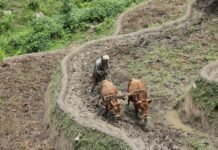NDTV World. High in the Himalayas, nestled within the Mustang district of Nepal, lies a trove of ancient mysteries: the Mustang Caves. Also known as “Sky Caves,” these roughly 10,000 enigmatic dwellings cling precariously to cliff faces, some soaring 150 feet above the valley floor. Their inaccessibility has long kept their secrets shrouded in shadows, accessible only to professional climbers and intrepid explorers.
A recent social media post by user @hiteshbindas reignited curiosity about these archaeological wonders, prompting questions about their origins, purpose, and the potential revelations they hold.
As reported by CNN, reaching Nepal’s Mustang region is often likened to discovering the mythical valley of Shangri-La for many travelers. Situated on the edge of the Tibetan plateau, Mustang has been a part of Nepal since the 18th century. Despite its integration, the region has preserved its traditional Tibetan culture in isolation. Formerly known as the independent Kingdom of Lo, Mustang, or Upper Mustang, is characterized by its high-altitude desert with vibrant red and ocher landscapes, deep gorges, and an expansive blue sky. Limited access to the region for travelers was granted in 1991.
The news portal further mentioned that for centuries, traveling ascetics of the oldest school of Tibetan Buddhism have wandered the valleys of Mustang, using its caves to perform advanced tantric yoga. The deep gorges of Mustang are the perfect setting for those wanting to practice tummo, a form of Tibetan breathing that allows a person to generate heat at high altitude or tackle negative emotions.
Visitors can hike along narrow cliffs, climb into a cave, and absorb the silence and mesmerizing views of the sky and mountains. Most caves are empty, but some have frescoes and statues inside. Some cave entrances are locked and must be opened by a caretaker from a nearby village. Formerly a vibrant center of Buddhist scholarship and art, Mustang’s temples also feature amazing Tibetan art.









































